
Ben je geïnteresseerd in film, muziek of theater? Discussieer je graag over wat kunst eigenlijk is, of hoe je een specifieke film, een popnummer of een theatervoorstelling moet interpreteren? Lijkt het je interessant om de effecten van kunst en media op de maatschappij te bestuderen?
Bij Kunst, Cultuur en Media krijg je (a) een dieper analytisch, historisch en theoretisch inzicht in twee van de volgende kunstvormen: film, muziek, theater/levende kunst, beeldende kunst of literatuur; en (b) gespecialiseerde wetenschappelijke kennis binnen een van de twee volgende specialisaties: ‘Arts, Policy and Cultural Entrepreneurship’ of ‘Arts Analysis and Criticism.’ Deze brede multi- en interdisciplinaire combinatie is uniek voor deze opleiding.
In deze opleiding leer je kunstwerken, variërend van romans en videoclips tot films en computerspellen, op een wetenschappelijke manier te bestuderen. Je bekijkt hoe ze geproduceerd, gedistribueerd, gebruikt, ervaren, gewaardeerd en maatschappelijk ingebed worden. Als afgestudeerde van deze opleiding kun je terecht in diverse functies op het gebied van kunst en media.
Als student schrijf je je in voor een of twee van de kunstdisciplines die binnen de afdeling worden aangeboden: Film, Theater en/of Muziek. Literatuur en Visuele kunsten kunnen alleen als tweede kunstdiscipline worden gekozen.
Een aantal actuele thema’s op het gebied van kunst in de maatschappij is te vinden in onze blog.
De opleiding Kunsten, Cultuur en Media is uniek omdat deze het volgende biedt:
Het eerste semester biedt een overzicht van de geschiedenis van de kunsten in de maatschappij, van de prehistorie tot nu. Je maakt kennis met de maatschappelijke functie van de kunsten en ontwikkelt tegelijkertijd je wetenschappelijke schrijf- en onderzoeksvaardigheid.
| Semesters | ||||
|---|---|---|---|---|
| VakkenVakkencatalogus > | 1a | 1b | 2a | 2b |
| Introduction to Audiovisual Arts A and B (10 EC) | ||||
| Life Imagined: The Arts in Culture A and B (10 EC) | ||||
| Sociology of Arts I and II (10 EC) | ||||
| Reality Contested: Visual Arts 1800-1914 (5 EC, keuzevak) | ||||
| Thinking about Art I: Philosophy of Art (5 EC) | ||||
| Film I a/b (10 EC, keuzevak) | ||||
| Literature I (10 EC, keuzevak) | ||||
| Music I a/b (10 EC, keuzevak) | ||||
| Theatre I a/b (10 EC, keuzevak) | ||||
| Arts and Cognition (5 EC) | ||||
| Blurring Boundaries in Arts 1914-now (5 EC, keuzevak) | ||||
In het tweede jaar ga je je specifiek richten op jouw kunstspecialisatie: film, muziek of theater. Je bestudeert de geschiedenis en theorie van deze discipline, en kiest een van de twee specialisaties voor het bestuderen van hedendaagse professionele kunstwerelden: 1. Arts Policy and Cultural Entrepreneurship (APCE), 2. Arts Analysis and Criticism (AAC)
| Semesters | ||||
|---|---|---|---|---|
| VakkenVakkencatalogus > | 1a | 1b | 2a | 2b |
| Culture and Literature 1: Gendering Culture (5 EC, keuzevak) | ||||
| Culture and Literature Plus 1: Empirical Approaches (5 EC, keuzevak) | ||||
| Modern East Asian Art & Visual Culture (5 EC, keuzevak) | ||||
| Empirical Methods: Arts Policy Education (Specialisation APCE) (10 EC) | ||||
| Film II: Film History (10 EC, keuzevak) | ||||
| Mediality to Intermediality (Specialisation AAC) (10 EC) | ||||
| Music II: History and Theory; Classics (10 EC, keuzevak) | ||||
| Theatre II: History and Theory (10 EC, keuzevak) | ||||
| Art Now (5 EC, keuzevak) | ||||
| Culture and Literature 2: Otherness, Strangeness, Abnormality (5 EC, keuzevak) | ||||
| Culture and Literature Plus 2: Culture, Climate, Anthropocene (5 EC, keuzevak) | ||||
| Art & Architecture's Global Potentials (5 EC, keuzevak) | ||||
| Culture and Literature 3: Racism, Discrimination, Inequality (5 EC, keuzevak) | ||||
| Culture and Literature Plus 3: Imagining Europe's Tomorrow (5 EC, keuzevak) | ||||
| Film III: Film Theory (10 EC, keuzevak) | ||||
| Management and Entrepreneurship (Specialisation APCE) (10 EC) | ||||
| Music III: Popular Music Theory and Analysis (10 EC, keuzevak) | ||||
| Narrativity Across Media (Specialisation AAC) (10 EC) | ||||
| Theatre III: Theory and Analysis (10 EC, keuzevak) | ||||
| Art & Environment (5 EC, keuzevak) | ||||
| Literature II: Advanced Critical Theory (5 EC, keuzevak) | ||||
In het eerste semester van je derde jaar volg je een minor. Je kunt kiezen uit verschillende opties, waaronder een buitenlandminor of een career minor. In het tweede semester volg je drie vakken binnen je kunstvorm en specialisatie. In dit semester schrijf je bovendien je bachelorscriptie over een onderwerp dat verband houdt met zowel jouw kunstvorm als je specialisatie.
| Semesters | ||||
|---|---|---|---|---|
| VakkenVakkencatalogus > | 1a | 1b | 2a | 2b |
| Minor (30 EC) | ||||
| Evaluating the Arts (Specialisation AAC) (5 EC) | ||||
| Film/Music/Theatre Advanced Seminar (Specialisation AAC) (5 EC, keuzevak) | ||||
| Organising and communicating in the Arts (Specialisation APCE) (10 EC) | ||||
| Arts in Practice: Film, Music, Theatre or Dutch Infrastructure (10 EC) | ||||
| Thesis (10 EC) | ||||
| Programma-opties |
|---|
| Muziekwetenschap (specialisatie) Wie muziek studeert bij Kunst, Cultuur en Media krijgt inzicht in het brede spectrum van theoretische, historische en sociologische perspectieven dat bij de bestudering van muziek gebruikt wordt. In de vorm van vijf kerncursussen bevat het programma een grote variëteit aan muziekgenres, van Europese kunstmuziek tot Amerikaanse populaire muziek en geeft daarbij inzicht in analytische methodologieën, die studenten leren om de esthetiek van muziek, de concrete omgang met muziek en de culturele waarden die bij de uiteenlopende muziekgenres een rol spelen op een kritische manier te onderzoeken. Dankzij deze cursussen geraken studenten op de hoogte van de belangrijkste ontwikkelingen in de muziekgeschiedenis en in staat om formele muzikale kenmerken als vorm, ritme, melodie, thematische ontwikkeling, 'groove' en instrumentatie te herkennen. |
| Filmwetenschap (specialisatie) Film studeren bij Kunst, Cultuur en Media biedt studenten een breed spectrum aan perspectieven om de culturele rol van film, cinema en televisie te bestuderen. Binnen de kerncursussen leren studenten de esthetische, historische en formele eigenschappen van de verschillende film- en documentaire-genres te herkennen en te analyseren. In afzonderlijke case studies wordt film benaderd als resp. een medium, een kunstvorm, een esthetische ervaring (perceptueel, cognitief en emotioneel) en een historische en culturele praktijk. Bovendien biedt het programma een overzicht van de relevante theoretische, historische en filosofische benaderingen, zoals film- en mediageschiedenis en -theorie, media archeologie, film filosofie en fenomenologie, kunsttheorie, moderne mediatheorie en perceptie-, emotie- en cognitiestudies. |
| Theaterwetenschap (specialisatie) De kernmodule theaterwetenschap biedt studenten een inleiding in de theorie en geschiedenis van dramatische en post-dramatisch theater en muziek- en danstheater. Binnen deze specialisatie bestuderen studenten de rijke en diverse geschiedenis en theorie van theater, van oud drama tot dramatisch, postdramatisch theater en experimentele uitvoering, waarbij ze inzicht krijgen in een aantal perspectieven en onderzoeksmethoden. Door middel van individueel onderzoek en groepsprojecten richten studenten zich op de creatie en perceptie van theater; de doelen en intenties van theatermakers; en de ervaringen en interpretaties van het publiek. Tijdens hun studie blijven studenten theater en uitvoering voortdurend in contact met de hedendaagse theatermarkt door een aantal lokale en internationale producties en festivals te bezoeken, deel te nemen aan discussies met theatermakers voor en na de voorstelling en deze te organiseren, en dramaturgisch bij te dragen aan het creatieve proces van kunstenaars. Daarnaast wordt hen ook gevraagd een eigen theaterproject te maken en dit publiekelijk te presenteren in een theaterzaal in Groningen. Op deze manier krijgen ze ook de kans om in aanraking te komen met de praktische kant van het artistieke proces. Coördinator Theater: l.d.m.e.van.heteren rug.nl |
| Kunst, Analyse en Kritiek (specialisatie) De specialisatie Arts Analysis & Criticism (AAC) is er om je expertise in één of verschillende kunstdisciplines aan te scherpen. Het daagt je uit om kritisch na te denken over verschillende kunstvormen, te analyseren hoe ze werken, waar de grenzen tussen deze kunstvormen liggen, en hoe deze constant veranderen. We leren je kunstwerken te analyseren vanuit verschillende kritische, filosofische en cognitieve raamwerken, om na te denken over de rol van historische tradities en nieuwe technologieën, en te werken aan je vaardigheden als kunstcriticus. |
| Arts Policy and Cultural Entrepreneurship (specialisatie) De specialisatie Arts Policy and Cultural Entrepreneurship (APCE) houdt zich bezig met hoe kunst en cultuur zijn georganiseerd. De basis voor de studie hiervan ligt in de algemene colleges kunstsociologie, waarin de positie van kunst in de maatschappij wordt bestudeerd, evenals de positie van kunstenaars in de samenleving. We bestuderen ook de organisatie van kunstinstellingen met name wat betreft communicatie over kunst. Coordinator Arts Policy and Cultural Entrepreneurship: Quirijn Lennert van den Hoogen (q.l.van.den.hoogen rug.nl) |
| Minoren (minor) Het vijfde semester besteed je aan je minor: een pakket samenhangende vakken dat toekomstgericht is. Het bereidt je voor op een vervolg in een mastertrack of op de arbeidsmarkt. Kies uit een careerminor, buitenlandminor, universitaire minor of facultaire minor. |
If you have passed the VWO (pre-university education) exam in English, you satisfy the language requirement.
If you have passed the VWO (pre-university education) exam in English, you satisfy the language requirement.
If you have passed the VWO (pre-university education) exam in English, you satisfy the language requirement.
If you have passed the VWO (pre-university education) exam in English, you satisfy the language requirement.
Language requirement English: Minimum requirement of TOEFL iBT 90 (with a minimum of 21 on all items), or IELTS 6.5 (with a minimum of 6 on all items) or Cambridge C1 Advanced or C2 Proficiency with a minimum score of 180. For more information, see: https://www.rug.nl/let/studeren-bij-ons/bachelor/aanmelding-en-inschrijving/language-requirements-ba
De opleiding verzorgt matching. Deelname is optioneel. Het advies is niet bindend.
De Faculteit der Letteren gaat er van uit dat jij, via een bezoek aan de Open dagen, deelname aan een Eén Dag student en/of aan een Webklas, jezelf goed hebt voorbereid op de opleiding van jouw keuze. Op basis van deze voorlichtingsactiviteiten bepaal jijzelf of je goed matcht met de opleiding.
Vragen over matching bij de Faculteit der Letteren? Hier kun je verdere informatie vinden: www.rug.nl/matching
| Type student | Deadline | Start opleiding |
|---|---|---|
| Nederlandse studenten | 01 mei 2026 | 01 september 2026 |
| EU/EEA studenten | 01 mei 2026 | 01 september 2026 |
| non-EU/EEA studenten | 01 mei 2026 | 01 september 2026 |
The Faculty of Arts believes students can decide for themselves whether they match with their chosen programme based on the available bachelor programme information, by visiting the Open Days, and by participating in a Webclass and/ or Student for a Day. If you are unable to attend one of these activities, a final opportunity for matching is to contact one of the students of the programme in June.
If you have any further questions about matching, check out: https://www.rug.nl/matching
| Specifieke eisen | Extra informatie |
|---|---|
| vooropleiding |
A Dutch VWO diploma, a German Abitur, an International Baccalaureate diploma, a European Baccalaureate or another diploma that is sufficient for acceptance to a Dutch university. For other VWO-equivalent qualifications, see: https://www.rug.nl/education/application-enrolment-tuition-fees/admission/procedures/application-informatie/with-non-dutch-diploma/entry-requirements/bachelor-entry-requirements/vwo-equivalent-qualifications. Students with Dutch 'hbo-propedeuse' diploma also need to meet the language requirements as mentioned below. |
| overige toelatingseisen |
Language requirement English: Minimum requirement of TOEFL iBT 90 (with a minimum of 21 on all items), or IELTS 6.5 (with a minimum of 6 on all items) or Cambridge C1 Advanced or C2 Proficiency with a minimum score of 180. |
| Type student | Deadline | Start opleiding |
|---|---|---|
| Nederlandse studenten | 01 mei 2026 | 01 september 2026 |
| EU/EEA studenten | 01 mei 2026 | 01 september 2026 |
| non-EU/EEA studenten | 01 mei 2026 | 01 september 2026 |
Veel studenten stromen na hun bachelor door naar een masteropleiding. Met een BA in Kunst, Cultuur en Media heb je een ruime keuze in vervolgopleidingen, zoals de volgende mastertracks aan de RUG:
Als afgestudeerde kun je terecht bij allerlei organisaties die met kunst te maken hebben.
Je kunt bijvoorbeeld aan de slag bij een theater, kunstbedrijf, concertzaal, poppodium, orkest of museum, of bij een uitgeverij, overheidsinstelling, onderzoeksbureau of publieke mediaorganisatie (radio, tv of internet). Je kunt werken als curator, onderzoeker of taxateur, maar ook als manager of beleidsadviseur.
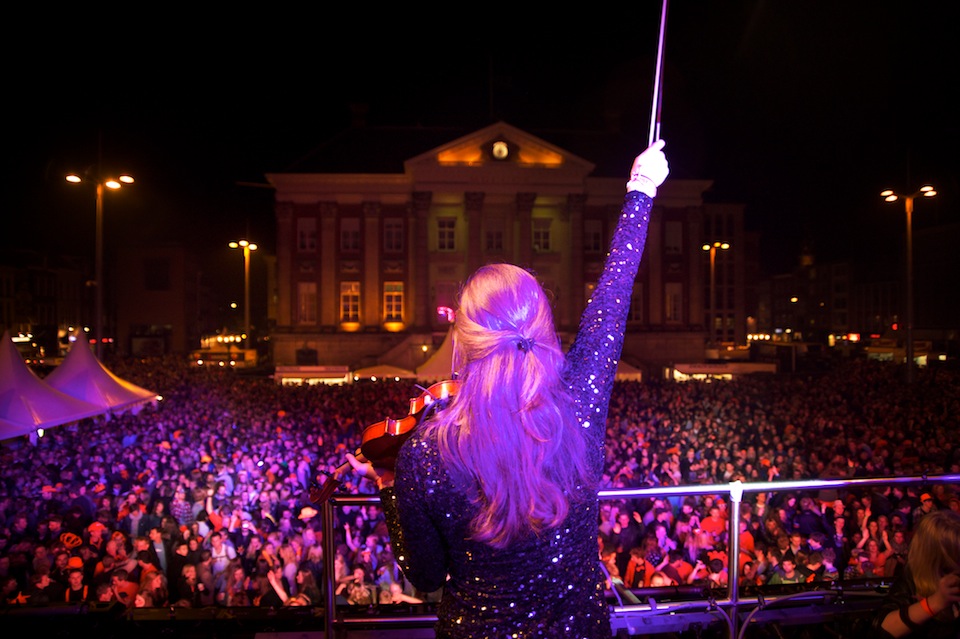
In de laatste paar decennia heeft de kunstsector grote veranderingen doorgemaakt en zich snel aangepast aan laat-kapitalistische verschijnselen als globalisering, digitalisering en de democratisering van creatieve kanalen. Door de toenemende invloed van cultuur en de creatieve sector in de steeds verder uitdijende wereldsteden, komen de ideeën over artistieke autonomie die in de 19e eeuw krachtig werden gepropageerd, nu weer naar boven in het filosofische en ideologische debat.
De positie van de kunsten in de maatschappij vraagt daarom om nieuwe vormen van conceptualisatie, definitie en legitimering.
Het Research Centre Arts in Society bestudeert zowel deze veranderingen als de nieuwe waarden die de kunsten en hun rol in de maatschappij omringen. Het Research Centre is onderverdeeld in zeven thema groepen:
Meer informatie is te vinden op de webpagina van het Research Centre Arts in Society.
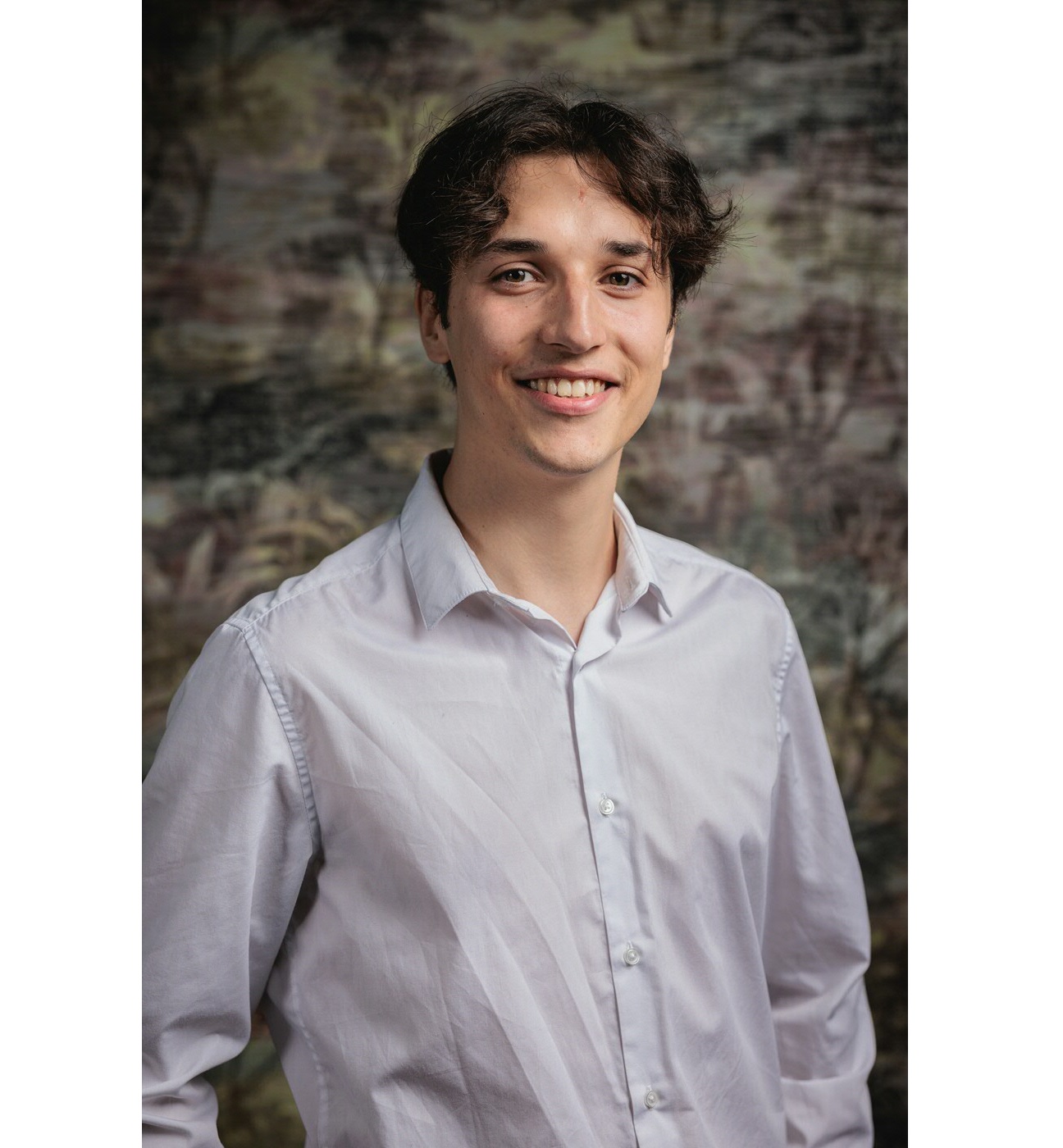
Hi, my name is Pierre Bentz and I am 21 years old. I have been studying Arts, Culture and Media at the University of Groningen since 2022, this is my fourth year in the city. I moved directly to Groningen after completing highschool in Strasbourg, France. I love working on many projects at the same time and getting involved in everything that sparks an interest in me!
I have always been more of an ‘arts person’. At first, I preferred to keep the arts as a hobby but I soon realized that studying something you love is *the way to go*. Enjoying what you study is the most important factor in choosing a potential programme: it will make your life as a student way easier. Arts, Culture and Media, is a theoretical programme that encompasses a very large range of topics regarding the arts and the society that engages with them. Starting off with courses that set the foundation for the knowledge you will use during your bachelor, you are quickly able to specialise in two disciplines to focus on: I chose Music and Visual Arts. You do not need to produce art yourself for this Bachelor which is an important point to note. I myself play music but someone with no knowledge on the topic could excel at the course as much as someone who has been playing an instrument for years.
Read more about Pierre and why he chose to studie Arts, Media and Culture in Groningen!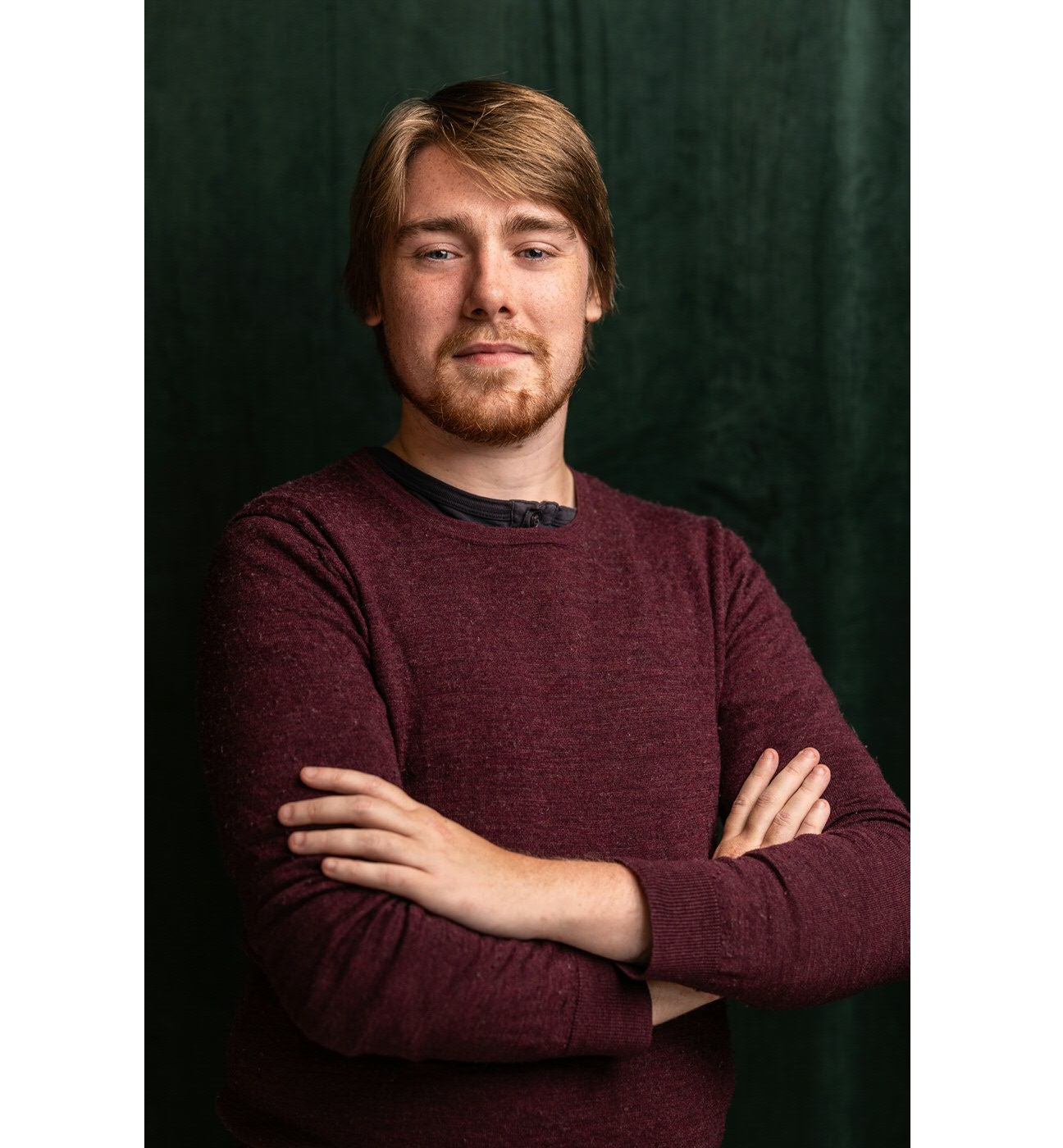
Hello! My name is Max van der Kooi and I am an Arts, Culture and Media (ACM) student. I am currently in my second year, specializing in Music and Visual Arts. Outside of my studies, I work part-time and I am a member of the Study Association IK. When I am not busy with work or studies, I game with friends or sometimes work on music at home.
Arts, Culture and Media spoke to me because of its variety of topics. I have an appreciation for all different types of art, but some interest me more than others do, so being able to focus on the disciplines I have the most interest in really stood out to me. The programme also lets you choose a specialization in the second year: Arts, Analysis and Criticism, or Arts, Policy and Cultural Entrepreneurship. I chose for Arts, Policy and Cultural Entrepreneurship, because of my interest in event management and the community aspects of art. The programme does not ask you to be ‘’good’’ at producing art, which I also like. I have tried making my own music, but I would not dare to send it to someone.
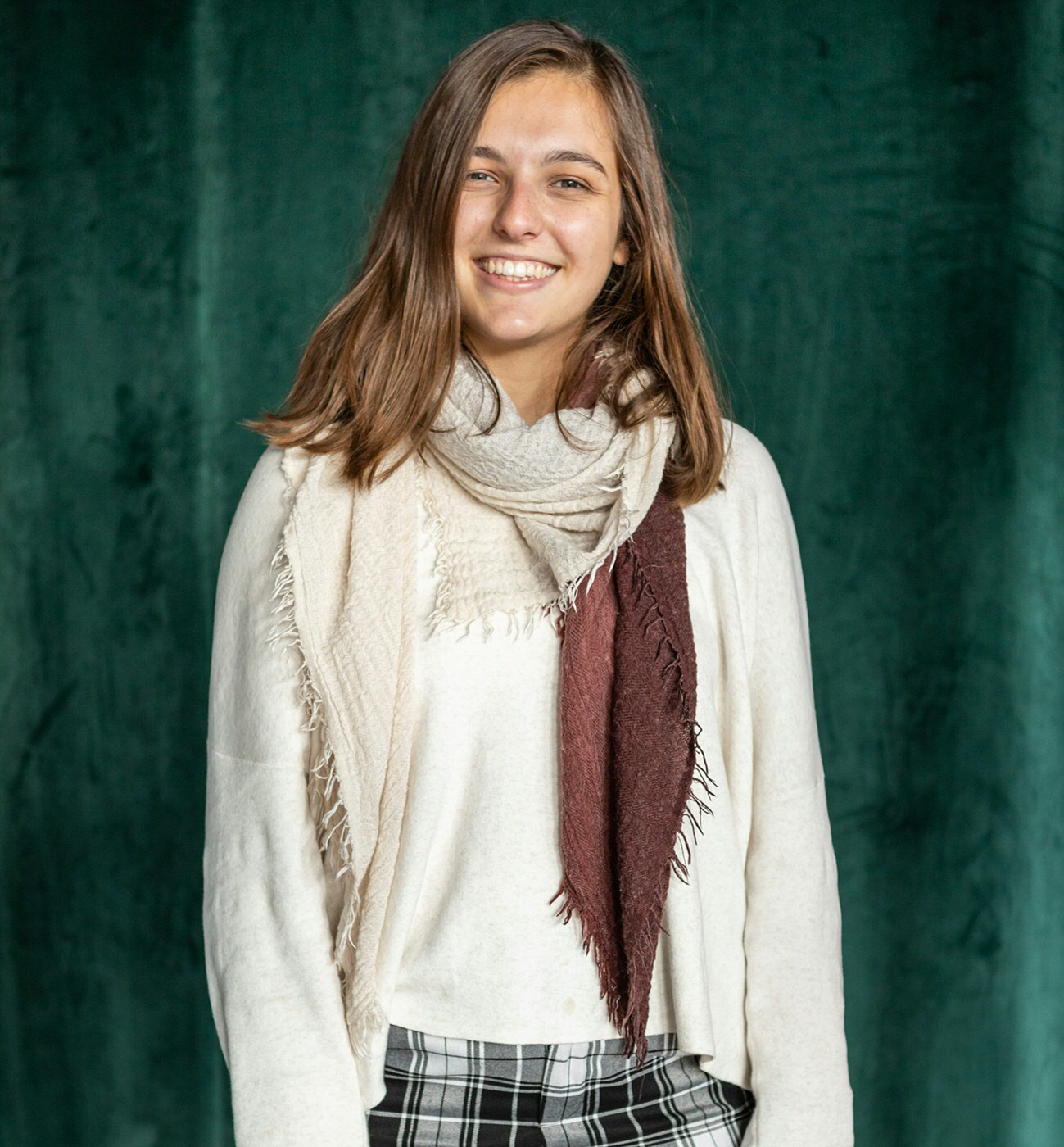
Hi there! My name is Giulia Cristofoli and I am an Arts, Culture and Media (ACM) student specializing in Theatre and Literature. I am from Brazil and this is my 3rd year living in Groningen. Asides from my studies, I work part-time, but I have also started an art magazine. My favourite hobby is taking dance lessons. I also enjoy reading, spending my days in the sun and hanging out with my friends.
What attracted me to ACM was the variety of topics covered by the course. I love art in general and I found it difficult to only focus on one discipline. The programme allowed me to choose two art disciplines to delve deeper without letting go of the others. It was the perfect opportunity to investigate the world of art in a broader context and still get into specifics on my preferred topics. The way the course was organized enabled me to first get a taste of the options and then choose within my range of interests. Not to mention that ACM was a way for me to stay close to what I love – art – without necessarily having to produce art (let us just say that I am not a gifted artistic genius).
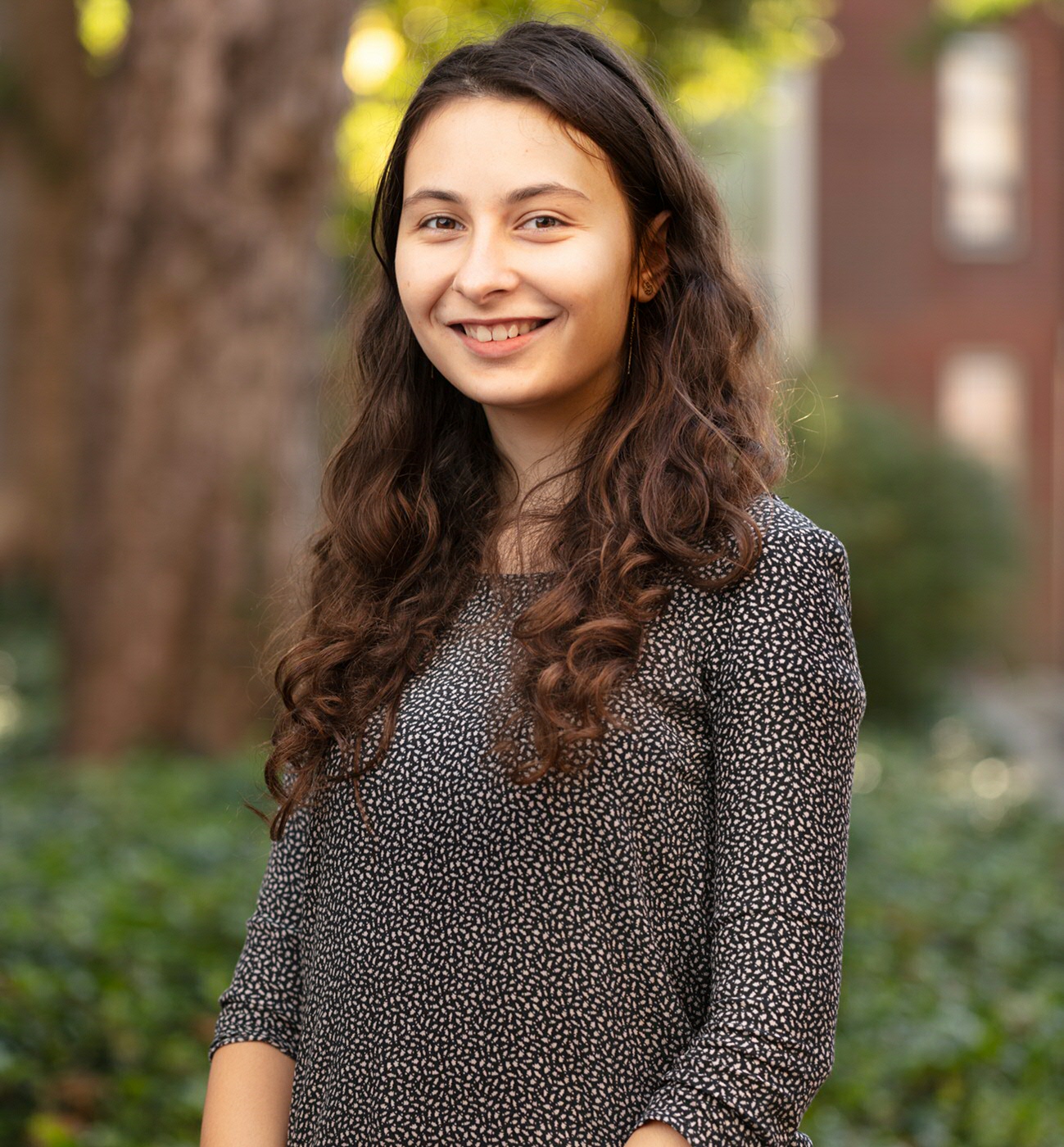
Hello! My name is Andreea and I am from Romania. I study Arts, Culture and Media with a specialization in Music and Film. If I am not studying, you will probably see me enjoying an artistic event or volunteering at a cultural or student organization. I am interested in a variety of topics, from law to religion to fashion, so if you need a conversation partner, do not hesitate to contact me!
I chose to study Arts, Culture and Media because I have always been interested in art although I was never the best at creating it. I could spend hours on end at an art gallery even if my painting skills were never above average and I wholeheartedly appreciate early rock music despite the fact that I cannot play an instrument. Consequently, this degree represented the perfect way for me to establish a relationship with art and to be able to approach it from a theoretical standpoint, inevitably deepening my passion for it.
Zit je op het vwo en wil je graag weten hoe dat is, studeren? De opleiding Kunsten, Cultuur en Media (KCM) biedt een webklas aan! Een webklas is een door de RUG gemaakte online cursus voor scholieren uit 5 en 6 vwo. Je kunt in zo'n cursus in tien studielasturen kennismaken met KCM door teksten te lezen, opdrachten te maken en met elkaar en de docent te discussiëren.
Interesse? Meld je dan aan voor de webklas.